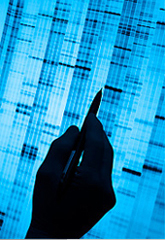
The newly launched NextCODE Exchange provides a browser-based hub for multi-center sharing and collaboration on collective data from massive whole-genome databases like the Haplotype Reference Consortium (HRC).
The American Society of Human Genetics (ASHG) meeting convened this week in San Diego, bringing together genetics experts from around the world to discuss programs with great potential to advance genomic-based medicine in the years to come.
To maintain the momentum generated this week, we need to find ways to integrate these important ideas, insights and programs, and to maximize the use of the massive databases that have been launched to support research on cancer, rare diseases and other pressing health topics.
One of the databases unveiled during the meeting was the Haplotype Reference Consortium, which aims to become the world’s most comprehensive database of genetic variations. Large databases like the HRC, along with several others already underway, can be tremendously helpful to researchers finding answers to some of the most challenging diseases. But there remains a significant bottleneck: these large, cumbersome databases cannot easily be shared and manipulated, limiting their utility for broad, multi-center genomic research.
The solution lies in the newly launched NextCODE Exchange (see release here). This browser-based hub allows for the sharing and harmonizing of massive whole-genome databases like the HRC to accelerate research. The integrated architecture allows users to visually confirm and validate findings in raw sequences, collaborating and sharing with others around the world who may have complementary research underway.
The momentum generated during ASHG will be multiplied by sharing and learning from the world’s collective genomic data on the NextCODE Exchange. Learn more here.







